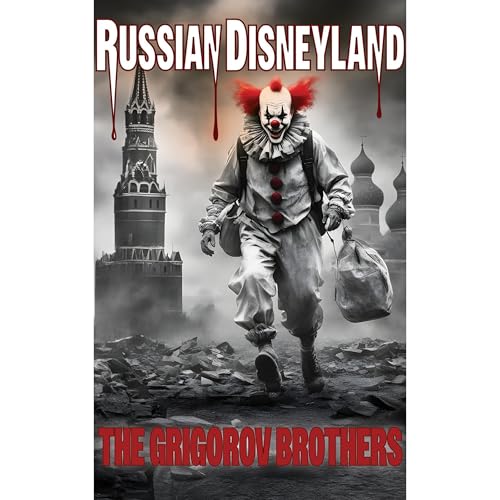
RUSSIAN DISNEYLAND
The Untold Story of How Russia's Disneyland Failed to Come True, saturated in Miracles, Money Laundering, Organized Crime and Blood
No se pudo agregar al carrito
Solo puedes tener X títulos en el carrito para realizar el pago.
Add to Cart failed.
Por favor prueba de nuevo más tarde
Error al Agregar a Lista de Deseos.
Por favor prueba de nuevo más tarde
Error al eliminar de la lista de deseos.
Por favor prueba de nuevo más tarde
Error al añadir a tu biblioteca
Por favor intenta de nuevo
Error al seguir el podcast
Intenta nuevamente
Error al dejar de seguir el podcast
Intenta nuevamente
$0.00 por los primeros 30 días
POR TIEMPO LIMITADO
Obtén 3 meses por US$0.99 al mes
La oferta termina el 21 de enero de 2026 11:59pm PT.
 Exclusivo para miembros Prime: ¿Nuevo en Audible? Obtén 2 audiolibros gratis con tu prueba.
Exclusivo para miembros Prime: ¿Nuevo en Audible? Obtén 2 audiolibros gratis con tu prueba.
Solo $0.99 al mes durante los primeros 3 meses de Audible Premium Plus.
1 bestseller o nuevo lanzamiento al mes, tuyo para siempre.
Escucha todo lo que quieras de entre miles de audiolibros, podcasts y Originals incluidos.
Se renueva automáticamente por US$14.95 al mes después de 3 meses. Cancela en cualquier momento.
Elige 1 audiolibro al mes de nuestra inigualable colección.
Escucha todo lo que quieras de entre miles de audiolibros, Originals y podcasts incluidos.
Accede a ofertas y descuentos exclusivos.
Premium Plus se renueva automáticamente por $14.95 al mes después de 30 días. Cancela en cualquier momento.
Compra ahora por $3.99
-
Narrado por:
-
Virtual Voice

Este título utiliza narración de voz virtual
Voz Virtual es una narración generada por computadora para audiolibros..
Visiting the USA in 1959, the extravagant Soviet leader Nikita Khrushchev unexpectedly wanted to include in his program a tour of the newly opened Disneyland. Surprised, the State Department denied the visit, citing insufficient time to ensure his safety in the vast park. American officials were puzzled when they learned of Khrushchev’s condition that the amusement complex must close its doors to the public while he was on its grounds. Shocked and offended that he had been refused, the Soviet leader threatened to create his own “Disneyland,” even more imposing and impressive than the American one. Returning to the USSR, Khrushchev ordered the start of work on a project called “Wonderland.” For unclear reasons, the project dried up, and only after thirty years, the mayor of Moscow Yuriy Luzhkov decided to revive it. Shortly after, a decree of President Boris Yeltsin appeared, and subsequently the “Children’s World of Wonders” foundation.
Miraculously, the project, brought out of the dust, based on an eccentric Cold War-era idea to build a magical park for the little ones, marked the beginning of the gambling industry in post-Soviet Russia. In an inimitable way, immersing the reader in the swampy lawless waters of the first decade of the newly independent Russian state, "Russian Disneyland" recreates an image of life, order, customs, manners and relationships that can hardly be understood through common sense. What follows is a series of events that intertwine the fates of the characters in a surreal, arrogant, and brutal way, forming a strange symbiosis between criminal groups and leading figures from the special services.
In order to stabilize its economy, in the mid-1990s Spain professed an open-door policy towards foreign capital. Banks and financial regulators turn a blind eye to the Money Laundering Prevention Law, as the country becomes a haven for criminals from around the world moving cash flows of dubious origin. Word of the Iberian miracle did not escape the Russian Federation either, leading to the creation of the largest scheme for laundering blood money on an international scale, gaining notoriety as the “Spanish Laundromat”. Huge amounts of cash have been taken out of Russia in suitcases or transferred to “tax havens” to be further laundered by investing in the global economy. The processes are dynamic and coincide with an idea that arose in the bowels of Russian military intelligence to use the criminal world to supply weapons to various terrorist organizations and dictatorial regimes. This seemingly atypical toxic amalgam is increasingly penetrating the highest circles of power, laying the foundations of Putin's Russia.
"Russian Disneyland" is a sequel to the Grigorov brothers' debut book, but it can also be read as a standalone novel.
Todavía no hay opiniones


